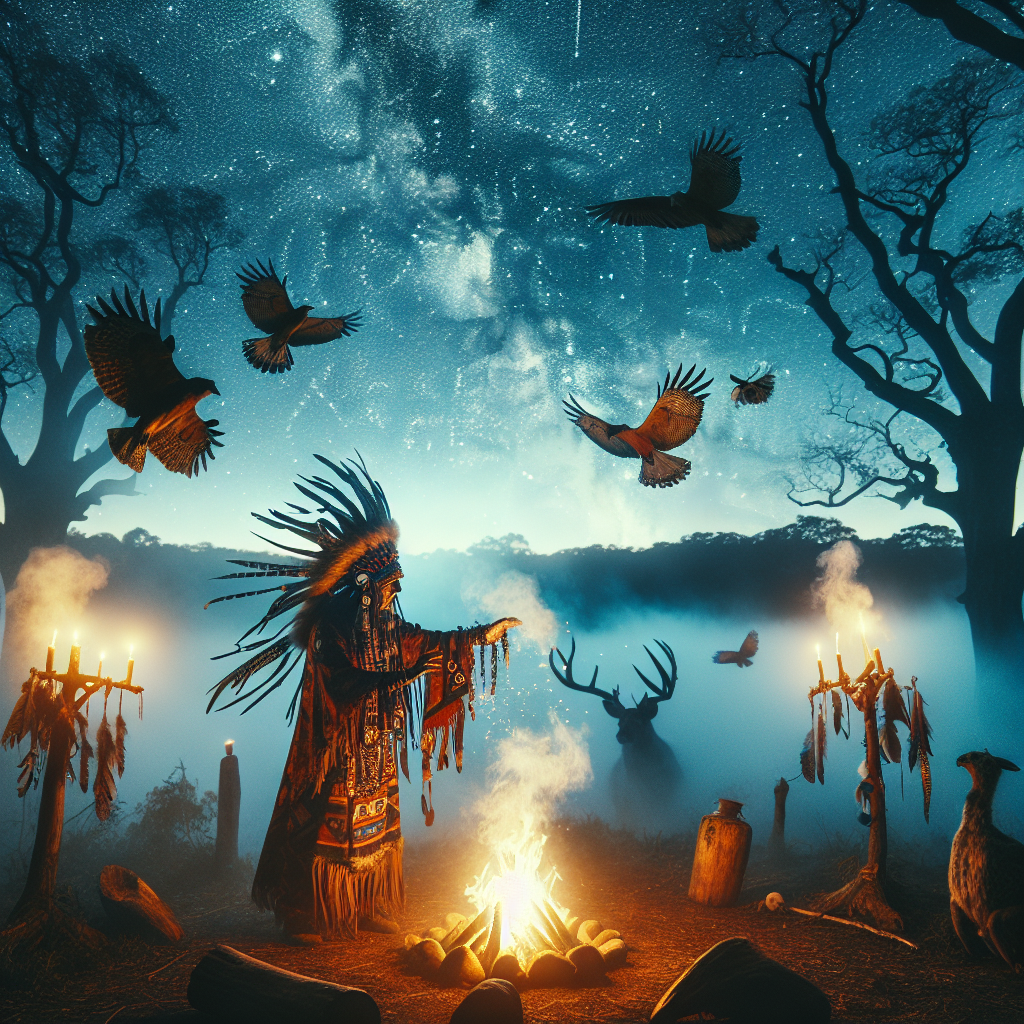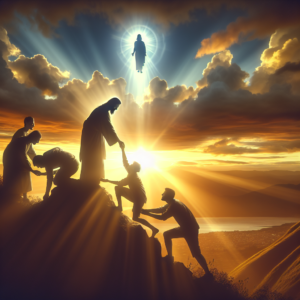Spiritual Devotional about Shamanism and Indigenous Wisdom
Embracing the Dance of Spirit: Shamanism and Indigenous Wisdom
In the vast tapestry of human history, there are threads of wisdom, faith, and connection that weave a story of oneness with the Divine and the natural world. Among these powerful threads are the ancient practices of Shamanism and the timeless teachings of Indigenous Wisdom. Today, let’s embark on a journey that intertwines these profound traditions with our own spiritual walk, drawing encouragement and inspiration from the deep well of shared human experience.
Shamanism is one of the oldest spiritual practices in the world, rooted in the belief that everything is connected through a vibrant, living spirit. Shamans, acting as bridges between the earthly and the spiritual realms, guide their communities in healing, wisdom, and growth. They work in sacred communion with the elements, animals, and ancestors, drawing on the power of the Earth and the cosmos to bring balance and harmony.
This reverence for creation and the spirit within aligns beautifully with the Biblical principle found in Romans 1:20 (NIV): “For since the creation of the world God’s invisible qualities—his eternal power and divine nature—have been clearly seen, being understood from what has been made, so that people are without excuse.” Just as the Bible encourages us to see God’s handiwork in the world around us, Shamanism invites us to listen to the whispers of the wind, the songs of the rivers, and the wisdom of the stones.
Indigenous Wisdom, similarly, encompasses a deep respect for the interconnectedness of all life. Rooted in the teachings of countless generations, it holds the Earth as sacred and humanity as its stewards. This wisdom emphasizes living in harmony with nature, respecting the spirit in all things, and fostering community through compassionate and sustainable living.
These values echo the Biblical mandate to “cultivate and care for” the Earth, as seen in Genesis 2:15 (NIV): "The Lord God took the man and put him in the Garden of Eden to work it and take care of it." Just as Indigenous teachings call us to honor and protect the land, Scripture reminds us of our sacred duty to be caretakers of God’s creation.
Furthermore, the themes of community and interconnectedness resonate with the Biblical principle of loving our neighbors as ourselves (Mark 12:31, NIV): "The second is this: ‘Love your neighbor as yourself.’ There is no commandment greater than these.” Shamanic practices often highlight the importance of healing and harmony within the community, underscoring the idea that our well-being is intertwined with the well-being of others and the world around us.
Incorporating these ancient insights into our modern lives helps us tap into a boundless reservoir of spiritual strength and wisdom. Imagine standing barefoot on the lush, dewy grass, feeling the heartbeat of the Earth beneath you, as you offer prayers of gratitude and hope. Picture yourself finding solace and healing under the canopy of a wise old tree, listening to the stories it has witnessed through centuries.
These spiritual practices remind us that we are not separate from creation but integral threads in the divine fabric of life. By embracing this holistic worldview, we can deepen our connection to God, others, and the Earth, finding renewed purpose and joy in our journey.
Let’s take a moment each day to honor the sacredness around us. Whether it’s through prayer, meditation, or simply being mindful of the beauty in nature, let’s foster a spirit of gratitude and reverence. As we walk our paths, may we be guided by the wisdom of the ages, united in the dance of the spirit that flows through all things.
In this shared light, we find hope, inspiration, and an ever-deepening relationship with the Divine and each other. Let your heart be uplifted by the ancient harmonies that still sing to us today, a testament to the enduring and universal truth of God’s love and creation.
With blessings,
[Your Name]
Explore and dig up answers yourself with our BGodInspired Bible Tools! Be careful – each interaction is like a new treasure hunt… you can get lost for hours 🙂
Q&A about Shamanism and Indigenous Wisdom
Sure! Here is a Q&A based on the topics of Shamanism and Indigenous Wisdom:
Q: What is Shamanism?
A: Shamanism is a spiritual practice that involves a practitioner, known as a shaman, who enters altered states of consciousness to interact with the spirit world and channel these transcendental energies into the physical world for healing, divination, and guidance. It is one of the oldest spiritual practices in human history and can be found in various forms in many indigenous cultures around the world.
Q: Who is a shaman?
A: A shaman is a healer, spiritual guide, and mediator between the human and spirit worlds. Through rituals, ceremonies, and often the use of natural substances, shamans journey into the spiritual realm to gain knowledge, address imbalances, and bring about healing for individuals and communities. They are often chosen through visions, spiritual calling, or lineage.
Q: What are some common practices in Shamanism?
A: Common practices in Shamanism include drumming, chanting, dancing, and using natural elements like plants and stones in rituals. Shamans may also employ techniques like soul retrieval, spirit communication, and energy healing. These practices are intended to restore harmony and balance within an individual or community, and connect them more deeply with nature and the cosmos.
Q: How do shamans enter altered states of consciousness?
A: Shamans use various techniques to enter altered states of consciousness, including rhythmic drumming, chanting, fasting, meditation, and the use of entheogenic plants or substances, such as ayahuasca or peyote. These methods help expand their consciousness and facilitate journeys into the spirit world.
Q: What is Indigenous Wisdom?
A: Indigenous Wisdom refers to the deep, holistic understanding of the world and the interconnectedness of all life that is held within indigenous cultures. This wisdom encompasses traditional ecological knowledge, spiritual practices, cultural rituals, and community-based living. Indigenous wisdom emphasizes living in harmony with nature, respecting all forms of life, and acknowledging the sacredness of the Earth.
Q: How is Indigenous Wisdom passed down through generations?
A: Indigenous Wisdom is typically passed down orally through storytelling, ceremonies, rituals, and practical demonstrations. Elders play a crucial role in teaching and preserving this knowledge, ensuring that it is shared with younger generations. This transmission of wisdom helps maintain the cultural identity and traditions of indigenous communities.
Q: What can we learn from Indigenous Wisdom in addressing contemporary global challenges?
A: Indigenous Wisdom offers valuable insights into sustainability, community resilience, and environmental stewardship. It teaches us the importance of living in balance with nature, the value of diversity, and the need for inclusive and respectful relationships. As we face issues like climate change, biodiversity loss, and social inequality, integrating Indigenous Wisdom can guide us in creating more sustainable and equitable solutions.
Q: How can one respectfully engage with and learn from Shamanism and Indigenous Wisdom?
A: To engage respectfully with Shamanism and Indigenous Wisdom, it’s crucial to approach these traditions with humility, openness, and a willingness to learn. Seek guidance from authentic practitioners and elders, support indigenous communities, and avoid appropriating or commercializing these spiritual practices. Understanding the cultural context and history behind these traditions is also important in fostering genuine respect and appreciation.


